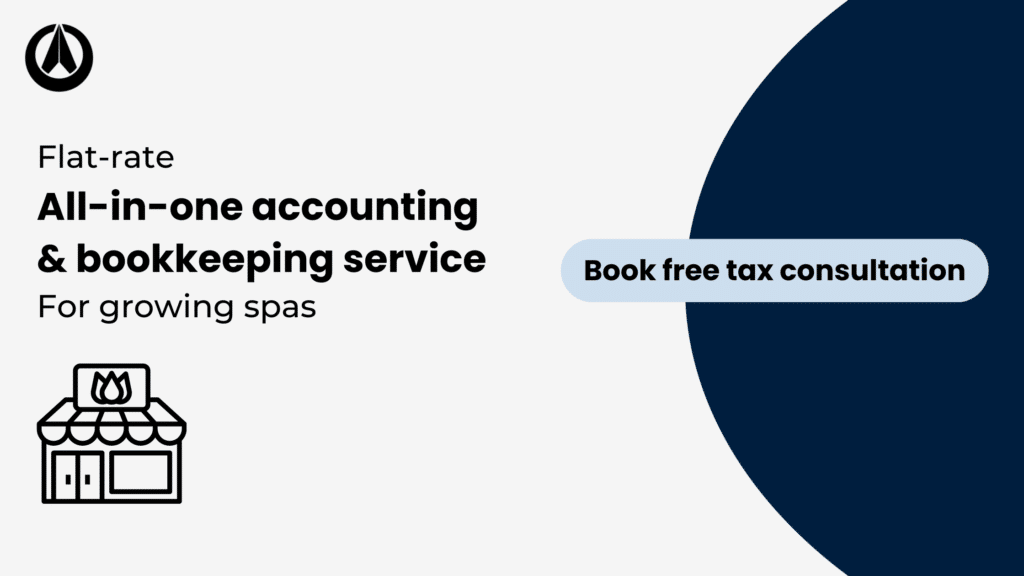How Spa Taxes Work In Canada

Need to get a better understanding of how spa taxes work in Canada? This is a free guide to help you understand your tax obligations as a spa owner.
Table of Contents
What are your tax obligations as a spa owner in Canada?
As a spa owner in Canada, you have several key tax obligations. You must report all business income and file an annual income tax return, either as a sole proprietor, partnership, or a corporation.
If your annual taxable revenues are $30,000 or more, you need to register for a GST/HST account, charge the appropriate GST/HST on services and products, and file regular GST/HST returns.
Additionally, if you have employees, you’re responsible for deducting and remitting payroll taxes, including Canada Pension Plan (CPP) contributions, Employment Insurance (EI) premiums, and income tax.
You may also be subject to provincial and municipal taxes like business licenses and property taxes based on your location. Maintaining accurate financial records is essential for compliance and tax preparation.
Types of taxes applied to spa businesses
Income taxes
Spa owners in Canada are required to report all business income and file an annual income tax return. For sole proprietors, business income is reported on their personal tax return, while incorporated spas file a corporate tax return. Income is calculated by subtracting allowable business expenses from total revenue.
Applicable tax rates vary depending on the profit amount and business structure. Accurate reporting and diligent record-keeping of all income and expenses are essential for compliance and optimizing tax liability.
Goods and Services Tax (GST) / Harmonized Sales Tax (HST)
Spa businesses with annual taxable revenues of $30,000 or more must register for a GST/HST account. GST is a federal tax, while HST is a combination of GST and provincial sales tax in certain provinces.
Spa owners are required to charge GST/HST on their services and products, such as massages, facials, and beauty treatments.
Examples of taxable services include spa treatments and product sales, while certain health-related services may be exempt. Regular GST/HST returns must be filed, which can be done monthly, quarterly, or annually, depending on the business’s revenue.
Payroll taxes
If a spa owner has employees, they are responsible for managing payroll taxes. This includes deducting Canada Pension Plan (CPP) contributions, Employment Insurance (EI) premiums, and income tax from employees’ wages.
Employers must remit these deductions, along with their share of CPP and EI contributions, to the Canada Revenue Agency (CRA) regularly, typically on a monthly or quarterly basis. Accurate payroll management ensures compliance with tax laws and supports employee satisfaction.
Provincial and municipal taxes
Spa businesses may also be subject to specific provincial and local taxes, which vary by location. These can include provincial sales taxes (such as PST in British Columbia), business licenses, and property taxes. Ensuring compliance with local tax regulations is crucial for uninterrupted business operations.
Spa owners must obtain the necessary business licenses and pay property taxes on any real estate owned by the business. Keeping up with these provincial and municipal tax obligations helps maintain good standing within the community and avoids potential penalties.
Need assistance with understanding spa taxes in Canada?
At Sansar Solutions, we have experience working with spas to identify tax saving opportunities before filing with the CRA. Book a free consultation for a no-obligation quote today.
Registration and compliance
To legally operate a spa business in Canada, you must register your business at both the federal and provincial levels. The typical steps involved can be outlined below.
Business registration
Choose a Business Structure: Decide whether to operate as a sole proprietorship, partnership, or corporation.
- Register Your Business Name: If you are not using your own name, register your business name with the appropriate provincial or territorial registry.
- Obtain a Business Number (BN): Apply for a Business Number with the Canada Revenue Agency (CRA). This unique identifier is used for various tax-related purposes.
Provincial Registration: Depending on your province, you may need to register your business with the provincial government. - Permits and Licenses: Obtain any necessary local permits and licenses specific to operating a spa, such as health permits.
Filing requirements
Understanding the frequency and methods of filing tax returns is crucial for compliance.
- Income Tax: Sole proprietors file their business income on their personal tax returns annually by April 30, while corporations must file a T2 Corporate Income Tax Return within six months of the fiscal year-end.
- GST/HST: File GST/HST returns either monthly, quarterly, or annually, depending on your annual revenues and chosen filing frequency. Filing deadlines range from one to three months after the reporting period ends.
- Payroll Taxes: Remit payroll deductions to the CRA regularly, either monthly or quarterly. The remittance due date is typically the 15th of the month following the deduction.
Key deadlines for these filings ensure compliance and avoid penalties.
Spa bookkeeping
Maintaining accurate financial records is vital for regulatory compliance and effective business management. Spa owners should keep:
- Sales Receipts: Document all sales transactions, including date, amount, and service or product details.
- Expense Reports: Track all business-related expenses, including receipts, invoices, and payment records.
Payroll Documents: Maintain records of employee wages, deductions, and contributions to CPP, EI, and income tax. - Tax Filings: Copies of all filed tax returns and remittance forms.
Good record-keeping practices ensure accurate reporting, simplify tax preparation, and provide valuable insights into the financial health of your business.
Consider industry specific spa bookkeeping services to assist with aspects of record keeping to file your taxes with accuracy and prepared for tax season.
Common tax deductions and credits for spas
Operating expenses
Operating expenses are essential costs incurred during the day-to-day operations of your spa business and are generally tax-deductible. Common deductible operating expenses include:
- Rent: Payments for renting your spa premises.
- Utilities: Costs for electricity, water, heating, and internet services.
- Supplies: Expenditures on beauty products, cleaning supplies, linens, and office materials.
- Insurance: Premiums for business insurance covering liability, property, and other risks.
- Marketing: Expenses for advertising, promotions, and branding efforts.
- Professional Fees: Payments for legal, accounting, and consulting services.
Accurately tracking and documenting these expenses helps reduce your taxable income and optimize your tax liability.
Capital cost allowance (CCA)
Capital Cost Allowance (CCA) allows you to deduct the depreciation of capital assets over time. For spa businesses, this can include:
- Spa Equipment: Depreciation of items like massage tables, saunas, facial machines, and sterilizers.
- Leasehold Improvements: Depreciation of renovations and structural improvements made to your leased premises.
CCA is calculated based on the asset’s category and the CRA’s prescribed depreciation rates. Properly utilizing CCA helps spread the asset cost over its useful life, reducing your taxable income incrementally.
Business use of home
If you operate part of your spa business from home, you can deduct a portion of your home-related expenses. Deductible expenses may include:
- Utilities: A percentage of electricity, heating, and water bills proportional to the space used for business.
- Home Insurance: A portion of insurance premiums.
- Mortgage Interest or Rent: A proportionate amount of mortgage interest or rent payment.
- Property Taxes: A percentage of property taxes based on the business-use area.
To claim these deductions, keep detailed records of the expenses and the proportion of your home used for business purposes.
Available tax credits
There are various tax credits available to small businesses, including those specific to the spa industry:
- Small Business Deduction: Reduces the corporate tax rate on the first $500,000 of active business income for Canadian-controlled private corporations (CCPCs).
- Input Tax Credits (ITCs): Allow you to recover the GST/HST paid on business expenses.
- Provincial Tax Credits: Various provinces offer credits for hiring apprentices or purchasing energy-efficient equipment.
- Training and Hiring Credits: Possible credits for employee training programs and hiring incentives.
Leveraging these deductions and credits effectively can significantly reduce your overall tax burden, allowing more funds to be reinvested into growing your spa business.
Special considerations for spa taxes
Tax requirements for selling spa products
When selling spa products such as skincare items, beauty products, and other retail goods, you are required to charge GST/HST. The applicable rate varies depending on the province where your business operates.
For instance, in Ontario, the HST rate is 13%, while in Alberta, the GST rate is 5% as there is no provincial sales tax.
Gift certificates and packages
Tax Treatment of Spa Gift Certificates
Gift certificates present unique tax considerations:
- At Sale: When a gift certificate is sold, GST/HST is generally not applied at the point of sale.
- At Redemption: GST/HST is applied when the gift certificate is redeemed for products or services. Charge the tax based on the value of the items or services purchased using the certificate.
Bundled Service Packages
Bundled packages that combine multiple services or products may complicate tax calculations. Key considerations include:
- Mixed Supplies: If the package includes both taxable and exempt goods/services, calculate the GST/HST proportionally based on the value of the taxable items/services within the bundle.
- Transparent Pricing: Clearly specify the components of the bundle and the applicable tax for each part to avoid confusion and ensure compliance.
Proper handling of gift certificates and packaged offers helps avoid tax discrepancies and ensures accurate tax remittance.
Health & wellness services
Tax Exemptions or Considerations
Certain health-related services may be exempt from GST/HST, depending on their nature and qualification under Canadian tax law. Examples include:
- Massage Therapy: Services provided by a registered massage therapist (RMT) may be exempt if they meet specific regulatory standards.
- Acupuncture and Physiotherapy: These services may also be exempt if provided by certified practitioners.
- Medical Purpose Treatments: Treatments prescribed by a licensed medical practitioner for medical reasons may qualify for exemptions.
Documentation and Verification
For tax-exempt services, maintain proper documentation to substantiate the exemption. This may include:
- Practitioner Certification: Verify and record credentials of practitioners providing exempt services.
- Medical Prescriptions: Keep copies of prescriptions or medical referrals for exempt treatments.
Understanding which services qualify for tax exemptions and ensuring proper documentation can prevent potential disputes with tax authorities and ensure compliance.
Tax planning tips for spa owners
Year round financial management
Effective financial management throughout the year is essential for the smooth operation and profitability of your spa business. Here are some best practices:
- Daily Record Keeping: Maintain accurate records of daily sales, expenses, and client transactions. Use a point-of-sale (POS) system that integrates with your accounting software to automate this process.
Weekly Reviews: Review financial transactions weekly to ensure accuracy and stay on top of any discrepancies. This includes verifying receipts, invoices, and bank statements. - Monthly Reconciliation: At the end of each month, reconcile your bank statements with your financial records to ensure all transactions are accounted for. This helps identify any errors or fraudulent activities promptly.
- Budgeting and Cash Flow Management: Develop a budget and monitor cash flow regularly. Track income and expenses against your budget to ensure your spa remains financially healthy.
- Expense Categorization: Properly categorize all expenses to maximize tax deductions. Examples include rent, utilities, supplies, marketing, and payroll. Use accounting software to automate and streamline this process.
- Document Storage: Store all financial documents safely, including receipts, invoices, and contracts. Digital storage solutions can help organize and easily retrieve documents when needed.
Practicing diligent financial management year-round ensures that your financial records are accurate, making tax preparation more straightforward and stress-free.
Working with a tax professional
Hiring a tax professional, such as an accountant or tax advisor, can provide invaluable support for managing your spa’s financial and tax obligations.
Benefits of Hiring a Tax Professional:
- Expertise: Tax professionals specialize in navigating complex tax laws and regulations. They can identify applicable deductions, credits, and strategies to minimize your tax liability.
- Time-Saving: Delegating tax preparation and planning to a professional frees up your time to focus on running and growing your spa business.
- Accuracy: Professionals ensure that your tax filings are accurate and compliant with federal, provincial, and local tax laws, reducing the risk of errors and audits.
- Strategic Advice: Beyond tax filing, professionals provide strategic financial advice to optimize your business’s financial health, such as cash flow management, budgeting, and long-term planning.
By working with a qualified tax professional, you can ensure your financial management is handled accurately and efficiently, allowing you to focus on your spa’s success.
File taxes on time
Filing taxes on time is crucial for spa owners to maintain the financial health and operational success of their businesses. Here are key reasons why timely tax filing is important:
1. Avoid Penalties and Interest Charges
When spa owners fail to file their taxes by the deadline, they can incur significant penalties and interest charges. The Canada Revenue Agency (CRA) imposes late-filing penalties, usually starting with 5% of the balance owing, plus additional percentages for each month the return is late. Over time, these penalties and interest can add up, placing unnecessary financial strain on your business.
2. Ensure Compliance and
Good Standing Timely tax filing ensures compliance with federal, provincial, and local tax regulations. Maintaining compliance helps your spa business avoid audits and investigations from tax authorities, which can be time-consuming, stressful, and potentially costly. It also helps maintain good standing with regulatory bodies, thereby protecting your business reputation.
3. Optimize Cash Flow
Management Filing taxes on time allows spa owners to plan and manage cash flow more effectively. Knowing your tax obligations and payment deadlines helps in allocating sufficient funds to cover these liabilities. Proper cash flow management ensures that you can meet other financial obligations, such as payroll, rent, and supplier payments, without disruptions.
4. Take Advantage of Tax
Deductions and Credits Timely tax filing enables you to accurately claim all eligible tax deductions and credits, such as operating expenses, capital cost allowances, and any specific incentives available to the spa industry. These deductions and credits can significantly reduce your taxable income and overall tax liability, freeing up capital for reinvestment in your business.
5. Maintain Accurate Financial Records
Regular and timely tax filing promotes diligent record-keeping and financial management. Accurate financial records are essential for tracking your spa’s performance, making informed business decisions, and preparing for future financial needs. Consistent and timely filings ensure that your records are up-to-date and reflective of your true financial position.
6. Reduce Stress and Save Time
Procrastinating on tax filings can lead to last-minute scrambles, increased stress, and the potential for errors. Filing on time allows you to approach the process in a more organized and relaxed manner, minimizing the risk of mistakes and ensuring that all necessary documentation is properly managed.
7. Enhance Business Credibility
Timely tax filing reflects positively on your business practices and financial responsibility. Maintaining punctuality in your tax obligations enhances your credibility with stakeholders, including investors, lenders, and regulatory authorities, fostering trust and confidence in your spa business.
RELATED:
Spa tax mistakes you should avoid
Navigating the complexities of tax compliance is a critical aspect of running a successful spa business. However, even well-meaning spa owners can make mistakes that lead to significant financial and legal repercussions.
From misclassifying employees to improperly applying GST/HST, these errors can result in costly penalties, interest charges, and increased scrutiny from tax authorities.
Understanding these common tax mistakes and knowing how to avoid them is essential for maintaining compliance and optimizing the financial health of your spa.
Misclassifying employees as contractors
One common tax mistake spa owners make is misclassifying employees as independent contractors. This misclassification can have significant implications, including penalties, back taxes, and interest charges from the Canada Revenue Agency (CRA).
Employees and contractors differ mainly in control and independence: employees work under the business’s direction using company-provided tools, while contractors operate independently, often providing services to multiple clients.
To avoid this mistake, spa owners should adhere to CRA guidelines, which consider factors such as control, ownership of tools, and financial risk.
Proper classification ensures compliance with payroll tax requirements, including contributions to Canada Pension Plan (CPP) and Employment Insurance (EI), and prevents costly legal issues.
Incorrectly applying GST/HST
Another frequent error is improperly charging GST/HST on spa services and products. Spa businesses must charge GST/HST on taxable goods and services, including treatments like massages, facials, and beauty products.
The applicable rate varies by province, and it’s crucial to determine the correct rate based on your location. Misapplying these tax rates can lead to under- or over-collection, resulting in financial discrepancies and potential audits.
Spa owners should maintain accurate records of all transactions and use reliable accounting software that automates tax calculations, ensuring correct application. Regular review and consultation with a tax professional can also help in staying compliant with GST/HST regulations.
Missing important deadlines
Missing tax filing and payment deadlines is a critical mistake that can trigger penalties, interest charges, and increased scrutiny from tax authorities. Failing to file income tax returns, GST/HST returns, or payroll remittances on time can result in financial penalties that compound over time.
To avoid missing deadlines, spa owners should implement organizational strategies such as maintaining a tax calendar with key dates, setting reminders, and using accounting software that tracks deadlines and generates alerts.
Regularly reconciling accounts and keeping meticulous financial records ensures that all necessary information is readily available when filing deadlines approach. Additionally, working with a tax professional can provide peace of mind, as they help ensure timely and accurate filings.
Inconsistent data entry
Inconsistent data entry can lead to inaccuracies in financial records, which complicate tax filing and financial analysis. When transactions are recorded irregularly, it becomes difficult to maintain a clear picture of the business’s financial health.
Inconsistent data entry can result in errors that snowball over time, leading to inaccurate tax filings and potential audits.
Spa owners should standardize their data entry practices using accounting software to automate and streamline the process, ensuring all transactions are consistently recorded.
Regularly reviewing and reconciling accounts can catch and correct inconsistencies promptly.
Overlooking receipts and documentation
Neglecting to keep receipts and proper documentation for expenses is another common mistake. Receipts are essential for substantiating expense claims, and without them, spa owners risk disallowance of deductions during an audit.
Maintain a system for collecting and storing receipts, whether physically or digitally. Using accounting software or mobile apps that scan and categorize receipts can simplify this process, ensuring that all expenses are documented and easily accessible for tax purposes.
Not leveraging reports and analysis
Many spa owners fail to regularly review financial reports and perform analysis, missing out on critical insights that can inform better decision-making.
Financial reports such as profit and loss statements, balance sheets, and cash flow analyses provide valuable information about the business’s financial performance.
Without leveraging these reports, spa owners may overlook opportunities for tax savings or fail to identify areas needing improvement. Regularly reviewing financial reports and consulting with a tax professional can help optimize tax planning and overall financial strategy.
Should you hire a professional for help with spa taxes in Canada?
Yes, hiring a professional for help with spa taxes in Canada is highly beneficial.
Tax professionals, such as accountants or tax advisors, have specialized knowledge and experience in navigating complex tax regulations specific to the spa industry. They ensure accuracy in tax filings, help identify eligible deductions and credits, and optimize your tax strategy to minimize liabilities.
Additionally, professionals can save you time and manage compliance effectively, reducing the risk of errors, missed opportunities, and potential penalties.
By leveraging their expertise, you allow yourself to focus on core business activities while ensuring your financial and tax matters are expertly handled.

Questions we get about spa taxes
You can deduct various operating expenses such as rent, utilities, supplies, insurance, marketing costs, and professional fees. Additionally, you may claim Capital Cost Allowance (CCA) for depreciating assets like spa equipment and leasehold improvements.
The frequency of filing GST/HST returns depends on your annual revenues. Small businesses typically file quarterly or annually, while larger businesses may be required to file monthly. Verify your specific filing requirements with the CRA to ensure compliance.
When selling gift certificates, GST/HST is generally not applied at the point of sale. However, GST/HST should be charged when the certificate is redeemed for taxable goods and services.
Certain health-related services, such as massages provided by a Registered Massage Therapist (RMT), may be exempt from GST/HST if they meet specific regulatory standards. Verify with the CRA for detailed exemption criteria.
As an employer, you must deduct Canada Pension Plan (CPP) contributions, Employment Insurance (EI) premiums, and income tax from employee wages. Remit these amounts, along with your share of CPP and EI, to the CRA regularly; usually monthly or quarterly.
Maintain accurate records of all financial transactions, including sales receipts, expense invoices, payroll records, and tax filings. Proper documentation ensures compliance and simplifies tax preparation and audits.
A tax professional provides expertise in navigating complex tax regulations, ensuring accurate filings, identifying deductions and credits, and optimizing your tax strategy. They also save you time and help manage compliance, reducing the risk of errors and penalties.
Share
Subscribe For Business Tax Tips & Insights
Get the update on business news, tax deadlines, and new insights to stay on top of your taxes.
Read more articles by Sansar Solutions

Business Tax Consultant: When To Hire
Not sure if you need a business tax consultant? This quick guide breaks down when and why to bring one on board—before it costs you.

Corporation Bookkeeping Guide Canada
If you run a corporation in Canada, understanding your bookkeeping duties isn’t optional—it’s essential for staying compliant and maximizing growth.

Best Online Bookkeeping Services for Small Business
Discover the best online bookkeeping services to keep your finances organized, accurate, and tax-ready—without the hassle.

Failure to File Corporate Tax Return: What Happens Next?
Dealing with failure to file a corporate tax return is something that should be resolved before things get worse. Missing tax deadlines isn’t just about penalties—it threatens your business’s very survival.

Impact of Filing Corporate Taxes Late with CRA
Don’t panic about filing corporate taxes late! This comprehensive guide walks you through what happens next, how to minimize penalties, and practical steps to resolve your situation with the CRA.

Xero Online Bookkeeping: Is It Worth It?
Is Xero online bookkeeping worth it? Discover the pros, features, and benefits to see if Xero is the right choice for your business.

